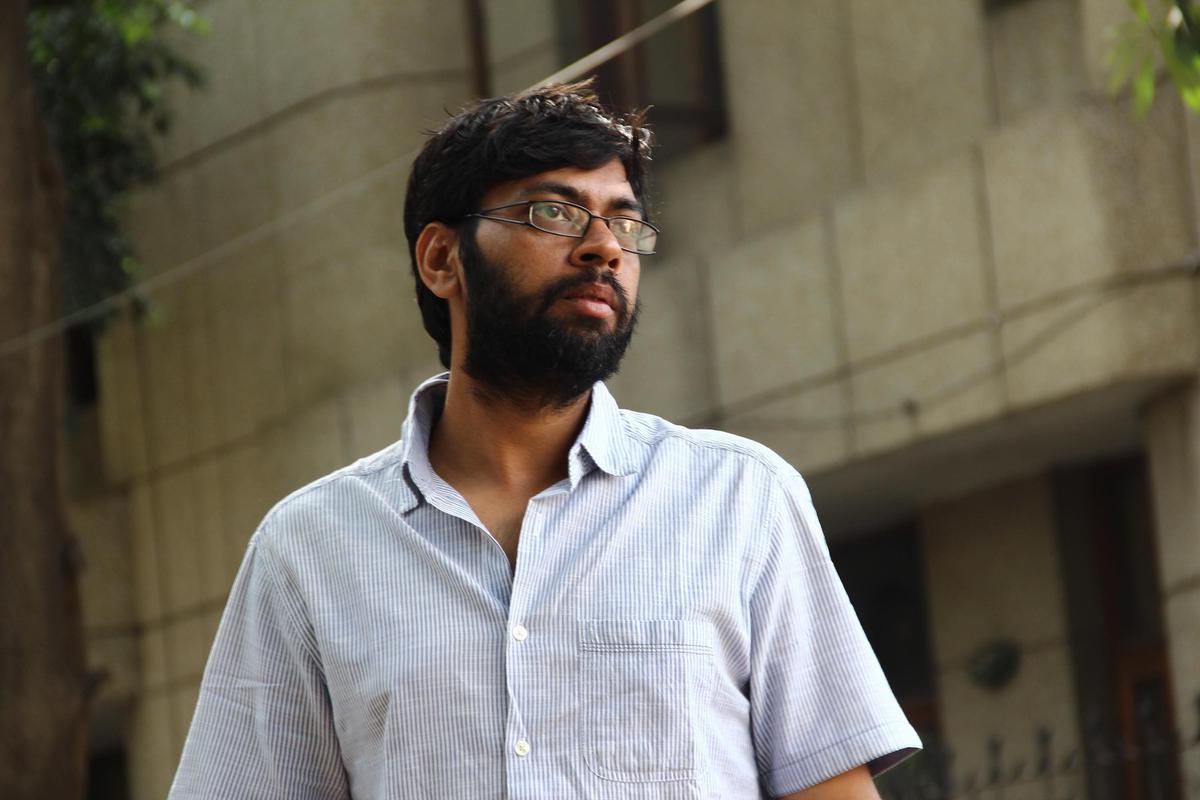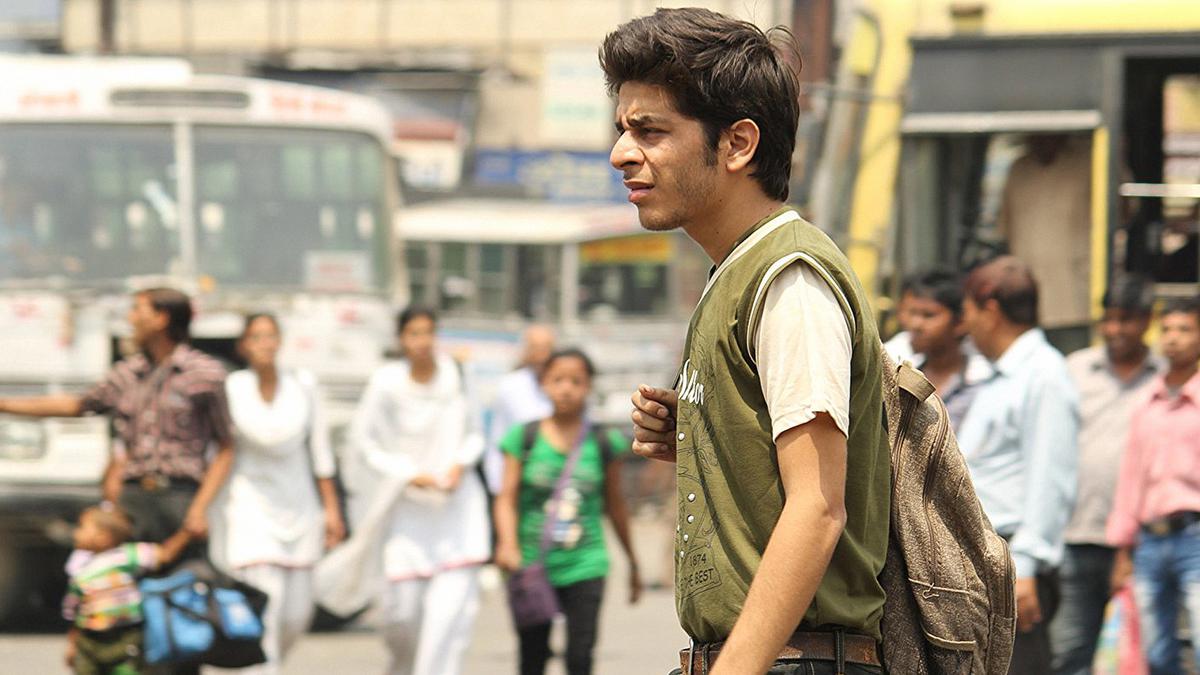Kanu Behl resides on the 19th floor of an airy condominium tower in Mumbai. A level below is his office, the size of a roomy 3BHK. The complex is located in the far end of the western suburbs; it overlooks, if you can crane your neck high enough from the road, lush swathes of the Versova-Lokhandwala mangroves. For someone whose films are about cramped, oppressive spaces — as evinced by Titli, Binnu Ka Sapna, and the forthcoming Agra — this is a rather pretty patch he has secured for himself.
“We moved in here last year,” says the director, who shares both apartment and work space with his wife, composer Sneha Khanwalkar. “We needed the quiet.” Squarely into his 40s, with a denser beard, Behl looks different from his older interviews on YouTube. That was circa 2014, when Titli — his bleak, coruscating debut feature, about a family of carjackers in Delhi — premiered at the Cannes Film Festival.

Filmmaker Kanu Behl
Behl is back at Cannes this year with Agra, set to premiere in the Director’s Fortnight section. We’ll get to the status of his red carpet outfit selection (an embarrassed head shake). For now, let’s rewind and reflect on the intervening years.
In pursuit of intimacy
Titli was one of those breakouts no one could stop talking about. That it was produced by Dibakar Banerjee and released by Yash Raj Films both elevated and confused its indie profile. Enthusiasts such as myself made the mistake of watching it on an empty stomach and instantly regretted it. The film’s first big scene, for instance, begins with preparations for a child’s birthday party and ends with the lead character bleeding profusely from the nose. The stomach-churning violence was in step with the film’s grim exploration of family dynamics. A theme was established: the instincts of patriarchy and oppression that get transmitted, with near-genetic precision, from one generation to the next.

A still from Titli
Unsurprisingly after Titli, Behl came down with second-feature fever. He wanted to make a film about sexual repression in India. “Given our cultural context, I knew it was going to be difficult to find funding for a film like this in India,” he says. In 2016, he was selected for the PJLF Three Rivers Residency in Italy, where his mentor, Danish editor Molly Stensgaard, pushed him to go all the way or abandon the idea. “I kept wondering, ‘ Karna hai kya?’ [should I do it?]”. After a month of introspection, he found his answer.
On the sets of Agra
Co-written with Atika Chohan, Agra has roots in Behl’s adolescence and early adulthood, spent between Punjab, Delhi and Kolkata (he studied filmmaking at the Satyajit Ray Film and Television Institute). A time when grown boys in their 20s wouldn’t discuss sex or girls. In what he shows me of Agra — which was shot in 2019 and took much of the pandemic to edit and assemble — the protagonist Guru (debutant Mohit Agarwal) is desperately on the lookout for sexual contact. He lives with his mother on the lower level of his house; Guru’s father, played by 90s heartthrob Rahul Roy, shacks up with a mistress on the upper floor. According to a synopsis, Guru’s sexual ‘odyssey’ turns a corner when he strikes up a bond with a polio-afflicted older woman. Priyanka Bose, Aanchal Goswami and Vibha Chibber and Ruhani Sharma round out the cast.
Rahul Roy in Agra
Bringing Rahul Roy onboard
Roy was suggested for the role of ‘Daddy’ by the film’s casting director, Prashant Singh. They wanted someone who looked the age but was also, in a way, ‘debonair’. Roy, known for era-defining hits like Aashiqui and Junoon, slotted perfectly into the role. Behl says the 55-year-old actor was seeking an experience like Agra. “Rahul spoke at length about the difficult parts in his life when he thought he had strayed. About certain decisions he regretted making. By the 12th or 13th day, he really opened up to us.”
“The film is about a boy trying to find intimacy,” Behl explains. “But because there are so many other desires that get bared in the sexual act, like the need for ownership, he is questioning whether sex, love and truth can co-exist.” It’s also a film about the spatial makeup of India, and how that shapes and informs our deepest instincts. “China has almost the same population as us, but they also have a huge land mass. We, by contrast, are packed together so closely like a can of sardines. I started looking at the structural, sociopolitical, cultural, and economic landscape of sexuality, and how spaces affect our desires.”
Mohit Agarwal in Agra
Is that the metaphor he was going for by situating the film in Agra, a populous Uttar Pradesh town that also holds humanity’s pre-eminent symbol of love? Another head shake. “The idea came from Agra ka pagal khana. Guru’s home is like a madhouse.”
A sherpa and not an auteur
Behl, as fans of the director might know, is notorious for putting his actors through the wringer. Titli’s Shashank Arora said in an interview that he was told, during the film’s workshops, to practise defecating in the open, to better absorb the grimy world his character hails from. Chetan Sharma of Binnu Ka Sapna was instructed to get in touch with real acid attackers (“I couldn’t,” Sharma tells me over the phone. “They were all in jail.”). It’s safe to presume newcomer Agarwal had to get into character too, for Agra. “Mohit is not Guru,” Behl states. “He is a charming ladies’ man. We had to put him on a no-sex regime for two-and-a-half months. He had to feel the noise in Guru’s head.”
On the sets of Agra
Behl reiterates his philosophy of filmmaking as a collective process — not just in the technical execution of scenes but in their emotional underpinning as well. He dislikes the ‘auteur’ theory, describing himself more as a ‘sherpa’ escorting climbers up a hill. In Titli, he cast his own father, late actor-director Lalit Behl, as the protagonist’s father, a huge move considering how personal the subject was to their past. His former partner Namrata Rao edited the film. He allows — even insists on — all his assistant directors and department heads to contribute to the experiential content of a film. “A film has the possibility of becoming a document of a specific time and space,” he says. “And the filmmaker is not the only person living in that space. It has to be a ripple effect.”
Our conversation is interrupted by a phone call — inquiries about lodging arrangements at Cannes. Behl is attending with his family (he has a three-year-old boy named Dunya). His outfit is not yet ready, he confesses. He plans on staying the full schedule. He is thrilled to catch Anurag Kashyap’s Kennedy, the other Indian title premiering at Cannes this year. Meanwhile, his next, Despatch, a sort-of thriller starring Manoj Bajpayee, is awaiting release on a streaming platform.
Kanu Behl onthe sets of Agra
He says he isn’t attached to festival recognition alone; he wants his films to be seen in India, even by the masses whose ordinary lives, familial dysfunctions and psychosexual hangups he so intently charts.
“An auto-rickshaw driver came up to me after seeing Titli and told me it was the truest thing he had ever seen. ‘ Zindagi toh yeh hi hai [this is what life is],’ the man said. So they are way more articulate and perceptive than any of us sitting at the top and infantilising them.”
Stay connected with us on social media platform for instant update click here to join our Twitter, & Facebook
We are now on Telegram. Click here to join our channel (@TechiUpdate) and stay updated with the latest Technology headlines.
For all the latest Entertainment News Click Here
For the latest news and updates, follow us on Google News.
